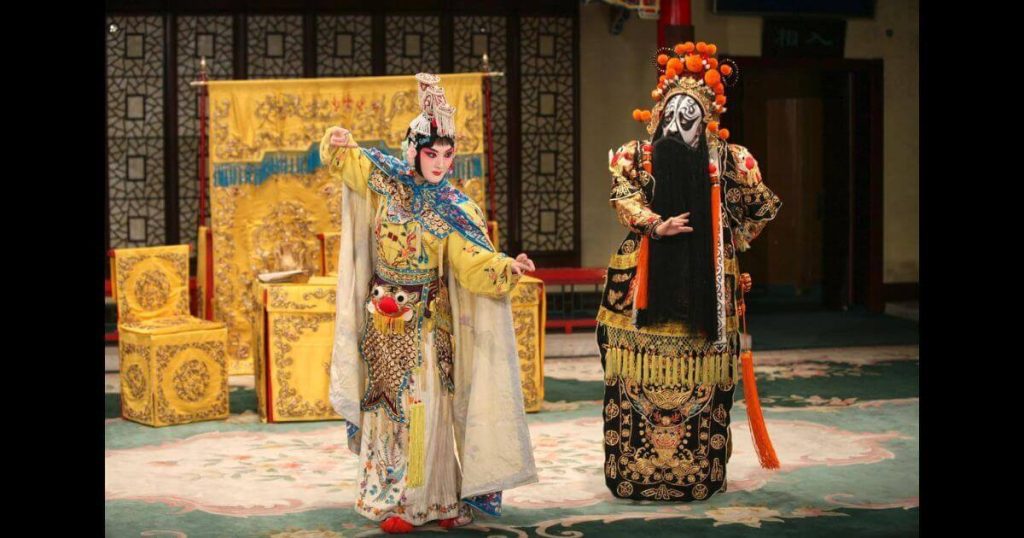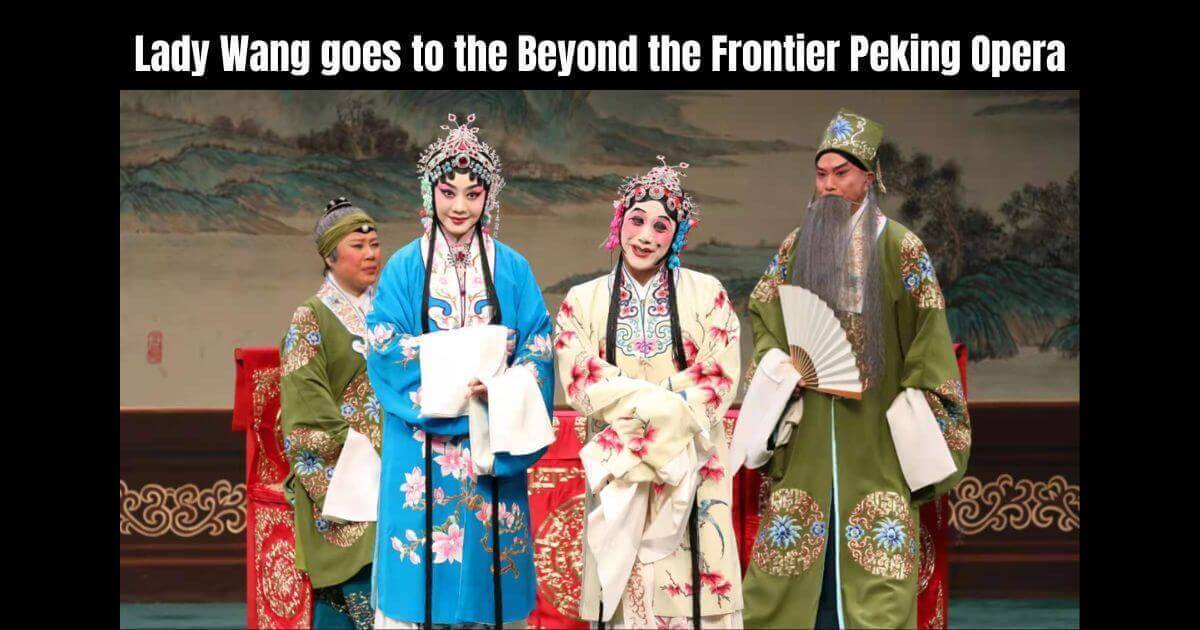Lady Wang Goes Beyond the Frontier is a popular story in Peking Opera, also known as Beijing Opera. It is based on the historical figure Wang Zhaojun, an ancient Chinese noblewoman. In this article, we delve into the fascinating world of Peking Opera, taking a closer look at its origins, unique features, and the iconic character, Lady Wang.
Unique Features
- Lady Wang Goes Beyond the Frontier (Zhao Jun Chu Sai 昭君出塞) is the latter part of the Han Ming Consort in Peking Opera. It portrays Lady Wang Zhaojun’s great sadness for leaving her homeland and facing an unknown fate. The opera is a masterpiece of Shang Xiaoyun, one of the “Four Famous Dan Actors”.
- There is a Cantonese Opera adaptation of Lady Wang Goes Beyond the Frontier set in the Western Han Dynasty (206 BC – 8 AD). The transformation showcases the story of Lady Zhaojun marrying outside the frontier.
- Wang Yaoqing was a renowned Chinese actor and singer known for playing the role of a virtuous adult woman, or qing, the most important role in Peking Opera.
- Beijing Opera, including Lady Wang, Goes Beyond the Frontier, is a scenic art form that integrates music, literature, aria, and face painting. It developed by absorbing many other dramatic forms and was popularized during the 18th century. Certain rules and regulations have been standardized through long practice[5].
Embrace Strength
One notable production featuring Lady Wang is “Lady Wang Goes Beyond the Frontier.” In this captivating performance, Lady Wang embarks on a journey beyond the familiar boundaries of her world, facing dangers and uncertainties. She discovers inner strength through courage and determination and triumphs over adversity.
Lady wang goes the beyond the Frontier Peking opera Songs.
The lead actress, with her impeccable vocal prowess, took center stage. She sang with a voice that resonated throughout the theater, conveying the character’s innermost thoughts and feelings. Though in a language unfamiliar to Lady Wang, the lyrics were infused with passion and brought a depth of meaning that transcended linguistic barriers.
As the performance progressed, Lady Wang found herself enthralled by the power and grace of the Peking Opera songs. Each note carried the weight of a thousand emotions, capturing the essence of the character’s joys and sorrows. The intricate choreography and acrobatics added an element of spectacle, enhancing the overall experience.
The time she seemed to stand still as Lady Wang immersed herself in the beauty and artistry of the “Beyond the Frontier” Peking Opera. The songs resonated deep within her, evoking a range of emotions she had never experienced. She laughed, she cried, and she marveled at the incredible talent displayed by the performers. Explore about How Can Art be Political now.
Lady wang goes to the beyond the frontier Peking opera script
Act 1: The Departure
Scene 1: Lady Wang’s Palace
(Lady Wang, a noblewoman in ancient China, is preparing to embark on a journey to Beyond the Frontier, a famous Peking Opera performance. Her servants and attendants surround her.)
Lady Wang: (Excitedly) Today is the day I have eagerly awaited! The Beyond the Frontier opera awaits us. Prepare my carriage and gather my companions.
Servant 1: Yes, Lady Wang. Everything is ready for your departure.
(Lady Wang’s companions, elegant ladies dressed in vibrant traditional attire, enter the scene.)
Lady Wang: (Addressing her companions) My dear friends, are you prepared to witness the grandeur of the Beyond the Frontier opera?
Companion 1: Lady Wang, we are honored to accompany you on this extraordinary journey. The tales of heroism and love in this opera have captured our hearts.
Companion 2: The performers are known for their exquisite skills and the emotional depth they bring to their roles. I can hardly wait to experience it firsthand.
Scene 2: The Journey Begins
(Lady Wang and her companions board the carriage, beautifully adorned with silk curtains and gold trimmings. They depart from Lady Wang’s palace.)
Lady Wang: (Looking out of the carriage window) As we venture beyond the city walls, the anticipation builds within me. The Beyond the Frontier opera is said to transport its audience to another realm.
Companion 3: Lady Wang, we are fortunate to have you as our guide. Your passion for the arts and extensive knowledge of opera make this journey all the more meaningful.
Lady Wang: It is my pleasure, dear friend. It has the power to enlighten and inspire us all.
Act 2: The Arrival
Scene 1: The Beyond the Frontier Theater
(The carriage arrives at the theater, adorned with colorful banners and lanterns. The sound of traditional Chinese music fills the air.)
Lady Wang: (Stepping out of the carriage) We have arrived at the Beyond the Frontier Theater. Let us immerse ourselves in the enchanting world of Peking Opera.
Companion 1: (In awe) The theater is a sight. It is intricate architecture and vibrant decorations mirror the grandeur of the performances.
Scene 2: Inside the Theater
(Lady Wang and her companions enter the theater and find their seats. The hall fills with excited chatter and anticipation.)
Lady Wang: (Whispering) The audience is abuzz with excitement. I can feel the anticipation building within me as well. The curtains will soon rise, and the magic of Peking Opera will unfold before our eyes.
Companion 2: Lady Wang, we are grateful for this opportunity to witness such an outstanding performance. Your love for the opera has enriched our lives and broadened our horizons.
Lady Wang: The opera is a testament to the beauty of storytelling, expressing emotions through music, song, and graceful movements.
(The lights dim, and the curtains slowly rise, revealing the elaborate Beyond the Frontier opera set.)
Peking opera movement
- Shili: Shili refers to the basic footwork in Peking Opera. Performers execute precise steps and rhythmic movements, including walking, running, jumping, and turning. The footwork designs to accentuate the character’s personality and status.
- Jinbu: Jinbu means “advancing steps” and involves moving forward with a firm and forceful stride. It represents determination, confidence, and aggression.
- Tuiqi: Tuiqi, or “retreating steps,” is the opposite of Jinbu. It involves moving backward gracefully and smoothly, symbolizing caution, hesitation, or retreat.
- Zouzhang: Zouzhang is a gliding movement performed by sliding the feet across the stage. It gives the illusion of floating or flying and use to depict heavenly beings, spirits, or supernatural characters.
- Dingbu: Dingbu is a stamping movement where performers forcefully strike the ground with their feet. It represents power, authority, or anger and use in martial arts scenes.
- Zhuanshen: Zhuanshen is a spinning movement where performers rotate their bodies swiftly in a circle. It portrays characters in moments of extreme emotion, such as intense joy or sorrow.
- Baozhuang: Baozhuang involves striking specific poses to express different emotions or characteristics of a character. Each pose has symbolic meanings, such as raised eyebrows for a surprise or crossed arms for defiance.
- Jitui: Jitui means “kicking steps” and involves swift and high kicks. It sees in martial arts scenes and represents agility, strength, and combat skills.

Characteristics of Chinese Opera
- Rhythmic Accompaniment: In Beijing opera, a popular form of Chinese opera, traditional Chinese string and percussion instruments provide a strong rhythmic accompaniment to the acting. This musical accompaniment enhances the dramatic effect of the performance.
- Allusion-based Acting: Chinese opera relies on allusion in its acting style. Gestures, footwork, and other body movements express various actions, such as riding a horse, rowing a boat, or opening a door. Through these physical expressions, the actors convey the actions and emotions of the characters they portray.
- Singing Style: Singing is an integral part of Chinese opera. The singing style in Chinese opera knows as “chàng” and involves delivering lines and intonations in a specific manner. The voices of the performers develops to project over large audiences. This distinct singing style contributes to the unique auditory experience of Chinese opera.
- Multifaceted Cultural Elements: Chinese opera incorporates various cultural elements, including music, painting, dance, martial arts, and acrobatics. These elements combine to create a multi-dimensional and visually captivating performance. Chinese opera originated from folk legends and was popular entertainment for ordinary people in ancient times.
- Comprehensiveness, Fictitiousness, and Formality: It condenses the essence of Chinese traditional culture’s aesthetic thoughts and offers a unique view of drama. These characteristics contribute to the distinct artistic brilliance of Chinese opera on the world stage.
- Folk Music Influence: It has close ties with dialects, folksongs, and the music used to accompany recital-and-song performances. This folk influence adds authenticity and cultural richness to the musical aspects of Chinese opera.



